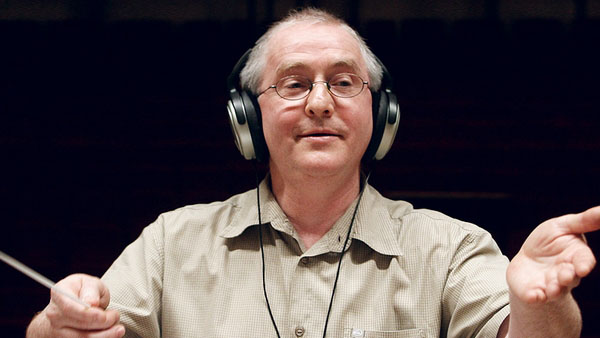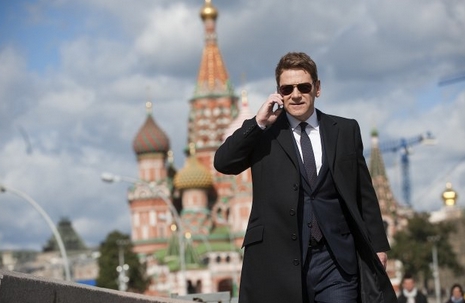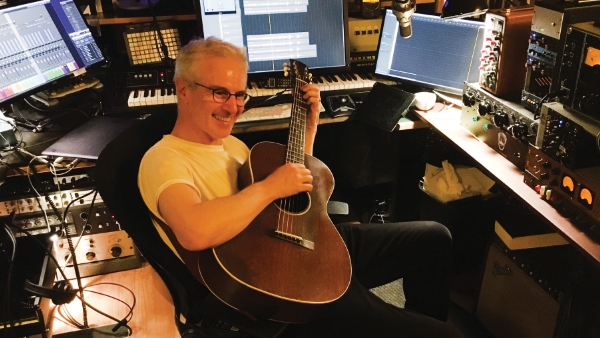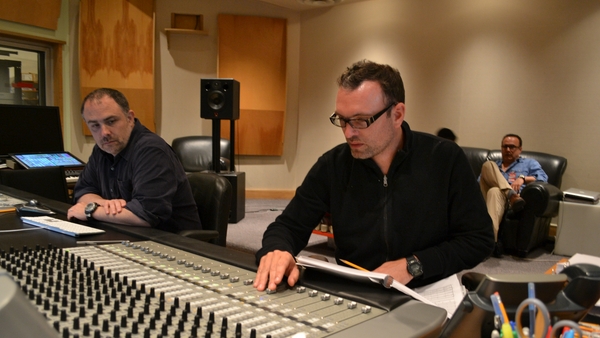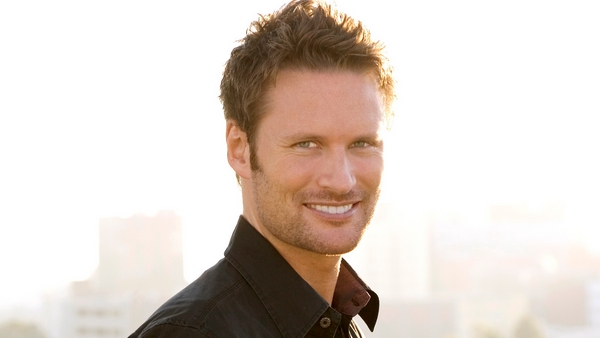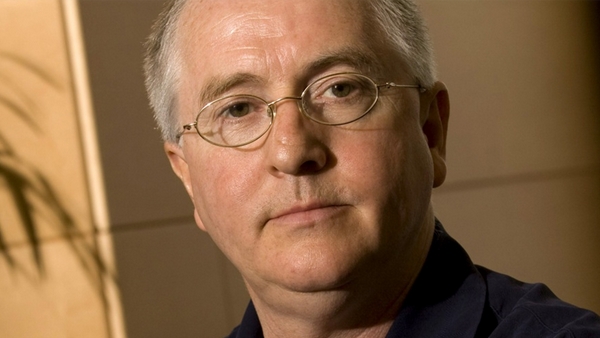 Hailing from Uddingston, Scotland, musical maestro Patrick Doyle always has the hugest smile on his face, which makes him either the happiest guy on the planet, or someone who just really, really loves his job. Perhaps it’s both, but you can’t go a few seconds without hearing him laugh. Even over the phone you can sense the endless joy in his voice when he talks about his career, his passion and his good friend Sir Kenneth Branagh. In fact, the rare (but widely abundant on the web) photo above is one of the few times you won’t see him grinning like a kid with a key to a candy store.
Hailing from Uddingston, Scotland, musical maestro Patrick Doyle always has the hugest smile on his face, which makes him either the happiest guy on the planet, or someone who just really, really loves his job. Perhaps it’s both, but you can’t go a few seconds without hearing him laugh. Even over the phone you can sense the endless joy in his voice when he talks about his career, his passion and his good friend Sir Kenneth Branagh. In fact, the rare (but widely abundant on the web) photo above is one of the few times you won’t see him grinning like a kid with a key to a candy store.
For years, decades really, his music has done for our ears what Drew Struzan’s posters do for our eyes; it adds that intangible magic that makes a film so much grander than it should be and makes us believe what we are seeing on the screen is real. Jack Ryan: Shadow Recruit marks the 11th time Doyle and Branagh have worked together in the last 25 years.
It might seem a bit insulting to the craft of composing if you go back to Kenneth Branagh’s 1991 film Dead Again (also scored by Doyle) where an actress asks Branagh’s character what he does for a living. When he responds, “I’m a composer” she dryly retorts “Oh well, in that case you’re not anybody” before promptly walking off. Shrewd, but that may just be a sampling of the inside jokes these two share after having worked together for so long.
Below are the highlights from our time with amazing composer Patrick Doyle who graciously squeezed us into his busy schedule.
GST: Thanks very much for making time for us Patrick. I’ve been a fan for a number of years so it’s an honor to speak to you, and congratulations on the fantastic score for Jack Ryan.
PD: Thank you very much, thank you.
GST: You have been best friends with Kenneth Branagh for 25 years and it might be tough to put it into words, but how do you quantify a friendship that’s lasted a quarter of a century?
PD: Ken is a fantastic person
and we have built up a level of trust over the years. He’s great to be around and we share a similar sense of humour. I like to have as much fun as I can during the process and for it to be as pain free as possible, as does Ken. There’s also a kind of shorthand that we have developed which is an enormous advantage in any working relationship; I seem to be able to read his thoughts and he trusts me. All these qualities help in creating a very pleasant work environment. He’s very loyal, as indeed am I, and I’m very grateful for his friendship.
GST: Regarding that comment about the trust you two have, does Kenneth tend to micromanage or does he give you the freedom to just go and do what you do best?
PD: No he doesn’t micromanage, I micromanage myself *laughs* and when he sees the results, he sees
that I’ve been very exacting in my work. He gives me a tremendous amount of scope. I like to get involved in the process as early as possible so that I can put my stamp on it before the temp tracking of the film. I’m included in very early discussions with regard to characterization and narrative. It means I have a musical input as early as possible based on Ken’s vision in terms of the look of the picture, the costumes, the design, etc. All those other aspects form the palette of filmmaking. We like to discuss our ideas continually throughout the process.
Generally speaking, he likes to have at least one main theme to weave its way throughout the film, which is fairly normal for a director. I also send him any other melodies, motifs, dramatic ideas or colors I feel he would respond well to. He is very open to fresh ideas and encourages me to be bold.
GST: You used the word bold, and I really have to commend you for the themes in the film, especially “Ryan, Mr President“, which are just that. I don’t care what country you’re from, that’s got to be some of the most patriotic music fans are likely to hear in any movie.
PD: *laughs* I’m glad you think so, because I’m very fond of America and have a great love of your country. My family has a long connection with America. My grandmother on my mother’s side and her entire family emigrated to America. They lived in Alabama for two years. Sadly, my grandmother lost her brother within three months to a bad cholera outbreak and it was too difficult for them to stay and so they returned to Scotland. I was brought up with all these great stories of America in 1910 before the First World War; it was astonishing to listen to her. She would regale endless stories about the Quartermaster store which was part of the mine where my great grandfather was the mine manager and where his two boys, my great uncles, worked for him. My grandmother and her sister looked after them all, as was the way then.
In fact, I composed a suite which Varese Sarabande released last year called “Impressions of America”, based on these imaginative tales and my own experiences of my frequents visits. I dedicated the album to my grandmother’s brother Archiebald who died in Alabama. In the Jack Ryan score, the “Ryan, Mr. President” theme is one more homage to your culture.
GST: Well I’m a little upset that people who saw the film didn’t get the impact of that theme. The score you created is very moving; I think what Kenneth did with the editing and pacing really ratchets up the tension and gives you a great canvas on which to lay your music. Tracks like “Get Out” or “The Lightbulb” really put you on the edge of your seat, but at the end “Ryan, Mr. President” is cut short so it doesn’t get to deliver its full fanfare. What’s the story behind that?
PD: We knew that the cue needed to be very patriotic to work with the scene, but after such an action-packed movie, the tone
didn’t feel right for an end title sequence. ‘Ryan, Mr President’ captures that particular moment, but the end titles, ‘Shadow Recruit’, capture the whole story. I composed the piece you heard on the soundtrack after the film was finished and lengthened it, because I felt I could develop it into an effective concert piece.
It worked out well and was performed in concert for my 60th birthday by the London Symphony Orchestra at The Barbican, with the very kind permission of the producers of Jack Ryan and Ken, as it was before the film opened. This made it a world premiere. We also performed “Faith of Our Fathers” with the London Symphony Chorus, and recorded it with mainly Russian singers for the album.
GST: It seemed a lot of the score pushed you into new directions, there were a lot of techno-infused themes and riffs which related to it being a techno-thriller. How different do you feel this experience was compared to your other more fully orchestral themes and compositions? Was it a learning curve for the mix of styles?
PD: For me, every score is a learning curve; I’m always keen to experiment and try out new ideas. I visited the film set, which I do whenever I can, and saw the ultra-modern hotel room in Moscow featuring Chris Pine as Jack. I was very impressed by the images of modern day Moscow’s financial district, which is as architecturally striking and contemporary as Wall Street in New York, and London.
Therefore I knew the score had to reflect this
contemporary world. These buildings utilise a plethora of different metals and glass so the look of the film and its locations are very edgy with strong angles and bright lights. As a result, these images of metal and glass needed to be addressed musically.
I spent three weeks with my programmer on one cue, which established the soundscape palette for the score. Specifically, the sounds featured in the tense scene where Jack is on a rooftop in Moscow. This cue was used to create the template for much of the picture; I wanted to give the score a sense of suspended time at this point and a feeling of The Third Man. I remember watching The Third Man as a kid and it came to mind in creating the feeling of loneliness that Ryan feels, being in a foreign environment. I used a treated balilike to capture the sense of the indigenous music of Russia.
GST: That makes a lot of sense. Playing up the foreign elements is a track like “Faith of Our Fathers” which is a nice choral work that also effectively calls back to what Basil Poledouris did in The Hunt For Red October. Was that your intention or what was Kenneth looking for that you were able to incorporate, aside from your own ideas?
PD: When I saw early footage of Kenneth’s character Viktor Cherevin praying as he lights a candle inside an Orthodox church, I imagined a traditional hymn being sung in the background by a male-voice choir as he prayed. Coming from a world of choral music myself, I felt it would be a wonderful opportunity to write such a piece. The words to “Faith of Our Fathers” come from an existing hymn that was translated into Russian and the score recalls this theme sporadically throughout the movie.
When Kenneth heard what I had written, he loved it. But he felt it was essential to have a shot showing the choir singing, so this was scheduled as a new shoot a couple of days later as a result of our meeting. We now cut away from Viktor to show a section of the choir singing during the scene. It is always exciting to experience those last minute decisions, which go on to make all the difference.
GST: One thing I really enjoy about your music is your process. They say that Hugh Jackman is the friendliest person in show business but you have to be the happiest person in show business. I’ve never seen a picture of you were you’re not just grinning from ear to ear. I love that special feature on the Rise of the Planet of the Apes Blu-ray that shows your efforts to create the score and you do that little subliminal music cue “I got a cookie for you, I got a cookie for you” (click here to see what we’re talking about) which is so funny.
So I’m wondering, was it your idea, when Jack goes back to the hotel a second time, to put what I consider ‘the Jack Ryan theme’ on the radio in sort of a jazzy, elevator-music kind of fashion?
PD:*laughs heartily* Well I take part of the credit *continues laughing*
GST: I just figured that it’s such a smart, self-aware gag that as soon as I heard/saw it I said, “yeah, I bet that was Patrick’s idea”.
PD: *continues laughing* Well, that’s a secret group you’re in now that you know about that. *laughs* Actually, I had a laugh at that scene myself at the premiere. When I heard it, I thought, “I’d forgotten we did that!” I suppose it’s a sort of
musical Alfred Hitchcock moment! Ken thought it was very funny.
A lot of people don’t realize that Ken is one of the funniest people on the planet. He affectionately refers to me sometimes as “laughing boy” as I do have a very sensitive funny bone! I was always told off by one of my music teachers at school. “Patrick, stop being so immature” she would say, so much so that to this day, one of my old friends and I joke back and forth, saying to each other “come on, don’t be so immature”.
When I was at the Royal Scottish Academy of Music, they often thought I wasn’t working hard enough because I would be giggling, laughing and having fun…a lot! I do work extremely hard and did so then. The goal is to try to lighten things up as much as possible. The job is hard enough, my goodness!
GST: Understandable and if you don’t love what you’re doing, you can’t have a good time. I know you have to get back to your session, so I’ve got two more questions for you. When you get to score a big budget film like a Paramount film or a Pixar film, or a small project like your commission to score the silent film “It” for the Syracuse International Film Festival, do you look at the budget and automatically know “ok, this means I can use this many musicians” or “I can only tell this story musically with an electronic arrangement”? How quickly are you able to get to grips with that?
PD: You have to cut your cloth to suit your suit. Invariably the budget is presented to you, but the composer might need to push for a certain budget if he or she feels the concept is not providing this in the early stages, once artistic decisions are made. Usually when people approach you, they’ve
made a realistic decision about the size of the orchestra. But sometimes they don’t take certain artistic requirements into consideration, so you have to work together to find something that works within their means of finance.
I’ve seen a film grow from a small to a big score and vice versa. On any film, you can’t always predict how things are going to play out, but with experience you can normally make a fairly sensible prediction as to what’s necessary.
GST: Whether it was a big score or a little score, what film or experience did you have where you felt you turned a cornerand it made you think that, “yes, this is what I should be doing”?
PD: I had been working for so long in the theater as a musical director, composer and also a performer, that when my first film composing opportunity came along after two years with the Renaissance Theater Company, I realized that it was my “raison d’être”, as it were. It was where I felt completely at home. It was difficult and challenging, but I knew from that moment on that I had an instinct for this world based on my observations from a very young age. Growing up, I never had any dreams of being a film composer, but I was acutely aware of how music and drama interacted in film, and also in theater. So when the opportunity to write the score for Henry V arose, and went on to have such an incredible reception, I was very encouraged.
GST: Well you are amazing at what you do and very few people know how to close out a movie like you do. You end Thor, Rise of the Planet of the Apes and Jack Ryan on a high note, but my absolute all-time favorite cue you’ve written was “Grand Central” from Carlito’s Way. It’s so astounding that I have to ask you, do you like to punish the string section? I kind of think maybe you have something against string instruments because you work a number on them, in a good way of course. *laughs*
PD: *laughs* Oh I do love strings, I adore them. I’m working with Mike Newell at the moment for the fourth time and he
says I’m a complete romantic, because the first place I turn towards is the string section. They are also essential for giving you drive and energy and are “the backbone of the orchestra”, as I was taught at school. Everything completely revolves around them in many ways. *laughs* They get you out of jail free many, many times. *laughs* One can twist and turn them due to their extraordinary flexibility to change the mood, wherever they are, at the drop of a hat; they are real value for the money!
GST: They say that film music is manipulation, but you’re so good at your job that I don’t mind being manipulated. Thank you so much.
PD: Well you’re very kind, Marc. I enjoy what I do, so as long as people continue to ask me, I’ll do my best.
Thanks to Patrick Doyle for his time. If you’re interested in more of his music, Patrick is working on a musical production for a film documentary about Africa called Enchanted Kingdom which will be shown in 3D. He’s also re-teamed with Kenneth Branagh to score Cinderella as well as the animated film B.O.O.: Bureau of Otherworldly Operations with DreamWorks so that will keep him busy through Summer 2015.
And if you’re in the UK this Spring and enjoy live music, Patrick will be conducting a retrospective concert called “The Music of Patrick Doyle from the Films of Sir Kenneth Branagh” with the Ulster Orchestra. Click here for more info about the performance which is presented in association with the Belfast Film Festival.
